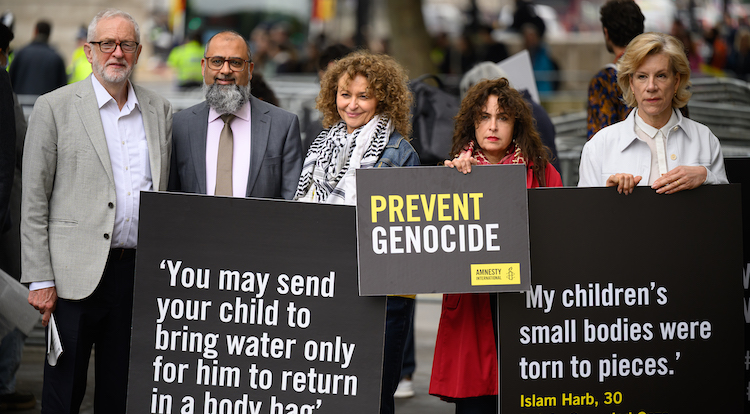If you’re going to plausibly accuse Israel of committing a war crime, you’ll have to get creative: The IDF’s unprecedented minimization of civilian casualties is a major obstacle to anti-Zionist hyperbole. Which is what surely accounts for the creativity on display in the wake of an American-led humanitarian-aid distribution that successfully excluded Hamas.
Israel’s critics, forced to find a way to denounce feeding hungry Gazans, settled on the fact that the Palestinians being fed had to wait on orderly lines. Characteristic of this flight from sanity was a post on X by a popular anti-Zionist account which was then amplified by Nassim Nicholas Taleb, the writer and mathematician with over a million followers on X.
The post showed a picture of Gazans lined up in five rows at the site where they were about to be handed boxes of free food juxtaposed with a picture of concentration camp inmates penned in by barbed wire. Above the photos was the text: “What Happened to Never Again”?
The instinctive response is to say: Those two things are different. But that is to miss the point. Taleb, a superstar academic and bestselling author, knows the magnitude of the falsehood he reposted. Indeed, no one thinks a free food kitchen is like Auschwitz. The lack of comparability between the two is what really upsets these demagogues.
Such posts have become fairly normalized throughout the current conflict. As I wrote in February, “‘Holocaust envy has only become more explicit: We see Palestinian journalists and activists calling themselves a ‘Holocaust survivor’ or saying ‘everyone in Gaza is a Holocaust survivor’ and declaring they ‘will proudly wear the Palestinian Keffiyeh to work, especially during the Palestinian Holocaust, just as I would have worn the Star of David during the Jewish Holocaust.’”
Holocaust envy isn’t new, nor do the Palestinians have a monopoly on it. But it is undeniably the lens through which the enemies of the people of Israel have chosen to portray this war. It is behind the International Criminal Court’s prosecution (and persecution) of Israel on the charge of genocide; it can be seen in the campus activists’ deeply sick support for Hamas’s campaign of mass murder and sexual violence; and it is perhaps the closest thing Europe has to a personality.
The question is why?
At first glance, the answer appears to be obvious. The founder of Palestinian Arab nationalism was literally a Nazi official during the Holocaust. Hajj Amin al-Husseini, a blond-haired and blue-eyed ally and admirer of Adolf Hitler, became the Nazis’ chief Arab propagandist. His life and work, from the beginning of Palestinian Arab nationalism in about 1920, was centered on the extermination of the Jewish people. He continued this fanatical pursuit even after Hitler’s death. The central node of Palestinian victimhood is a failed pan-Arab attempt to finish what Hitler started.
Holocaust envy, then, is a demented inversion of the current conflict’s modern origin story, a way for some Palestinians to wipe the slate of guilt clean and claim a false moral equivalence with their would-be victims.
For Europe, it’s even simpler. The Holocaust is not Europe’s only modern legacy, of course. But it is the continent’s ever-present demon. Some in Europe choose to attempt to dispel this demon by denying it ever happened. Others do so by erasing the level of evil attached to the great crime of the 20th century: If the Jews are capable of perpetrating such atrocities too, then nothing more is owed them.
Both of these explanations rely on the belief that the Holocaust was not unique.
But what if it was unique? What accounts for Holocaust envy in that case? One answer is that the Holocaust becomes a trump card; for the anti-Semites whose self-perception is based on their victimhood, the Holocaust inspires literal jealousy. For Europeans, if the Holocaust is unique then it can only be mitigated by the unique evil of its descendants. Thus, we come full circle and the Jews are back to being a problem the world has to deal with.
There is another angle to this. The Polish philosopher Stanislaw Krajewski last year proposed a brilliant theory on Holocaust envy and the role that its perceived uniqueness plays in the minds of those who would appropriate Jewish suffering for their own ends.
Krajewski points out that many people believe that the ability to attribute a death to a Holocaust-level act “somehow ennobles them… it is not just any death.” The killings of the Holocaust were not themselves noble deaths, however, he notes: they were intentionally humiliating.
Instead, one must think of the Holocaust as a holy war against the Jews: “let us recall that the great murder actions often began on Jewish holidays.… What is more, such acts as public desecration of Torah scrolls were also a favorite way to show who was superior. Apparently, the task was not only to kill Jews, but also to humiliate and destroy the Jewish religion. In a world without Jews—and this was Hitler’s dream—Judaism would have disappeared anyway, but by choosing such dates and introducing such behaviors, it was possible to immediately show the superiority of the German order over everything Jewish. And above all, it was possible to demonstrate to Jews, as well as everyone else, that the Jewish tradition, its most sacred moments, its sacred objects would be of no help.”
The Nazis, then, took the Bible very seriously. And the Bible’s main theme is the “election of the Jews.” The Holocaust was a revolt against God’s having chosen the Jewish people. To be the victims of the Holocaust, therefore, meant first being the one and only chosen nation. And that is both unique and ennobling—and the source of a poisoned global public discourse about Israel.


















